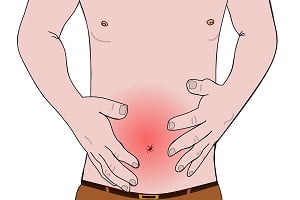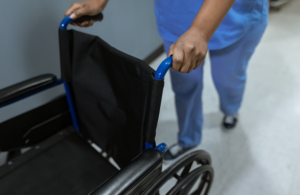Diarrhea: Causes, Symptoms, Complications, Treatment
- Updated on: Nov 9, 2022
- 4 min Read
- Published on Dec 26, 2020

What is Diarrhea?
Diarrhea is characterized by watery stools or recurrent bowel movement. Diarrhea lasts for a few days and often disappears without any treatment. It can be acute or chronic.
Acute diarrhea is short-term diarrhea that lasts for one or two days. The main cause behind diarrhea is food poisoning or certain side-effects of certain medications. Acute diarrhea is quite common. Chronic diarrhea is long-term diarrhea that lasts for at least four weeks. It occurs due to intestinal disease or disorder such as Celiac disease or Crohn’s disease.
Traveler’s diarrhea is a condition that occurs due to exposure to bacteria or parasites during a vacation in a developing country.
Causes of Diarrhea
Most cases of diarrhea occur due to bacteria, viruses, or parasitic infection. Inflammatory bowel diseases (IBD) such as Crohn’s disease and ulcerative colitis can cause chronic diarrhea. Your doctor recommends antidiarrheal medications to reduce diarrheal output. Certain nutritional and probiotic involvement can help prevent the occurrence of diarrhea.
Several factors can lead to diarrhea, such as:
Viral Infections
Most of the time, it is the viral infections that cause diarrhea. They are associated with mild-to-moderate symptoms such as fever, frequent, runny bowel movements, and abdominal cramps. It usually lasts upto 3 to 7 days. The most common viral agents causing diarrhea include rotavirus, norovirus, and adenovirus.
Bacterial Infections
Bacterial Infections cause the most serious type of diarrhea. These infections occur due to the consumption of contaminated food or drinks. Bacterial infections result in severe symptoms such as vomiting, severe abdominal cramps, fever, and abdominal pain. People suffering from diarrhea experience recurrent bowel movements that may be watery. Some individuals may experience “explosive diarrhea,” which could be forceful expulsion of loose, almost violent, watery stool along with gas.
The most common bacteria which lead to diarrhea include Campylobacter, Shigella, and Salmonella. The less common causes leading to bacterial diarrhea are due to Escherichia coli bacteria, Yersinia, and Listeria.
Parasites
Parasites are also common causative agents leading to digestive system infections. Parasitic infection occurs due to the consumption of contaminated water. Common parasitic agents leading to diarrhea include Giardia lamblia, Cryptosporidium, and Entamoeba histolytica.
Intestinal Disorders
Intestinal Disorders or diseases related to inflammatory bowel diseases (IBD) such as irritable bowel syndrome (IBS), microscopic colitis, diverticulitis, celiac disease, and malabsorption can lead to diarrhea.
In rare cases, IBDs result in the formation of hemorrhoids. Hemorrhoids require specific treatment methods for their cure.
Reaction to Certain Medications
Reaction to certain medications can also result in diarrhea due to consumption of antibiotics, cancer drugs, blood pressure medications, weight loss drugs, gout medications, and antacids.
Intolerance or Allergies to Foods
Intolerance or allergies to certain food items such as artificial sweeteners and lactose can lead to diarrhea.
Alcohol Abuse
Alcohol abuse can also result in diarrhea. Chronic alcoholism can result in loose stools.
Laxative Abuse
Laxative abuse is one of the principal causes of self-induced diarrhea. If you consume too many laxatives or take them too frequently, it can disturb your digestive system.
Diabetic Diarrhea
Diabetic diarrhea is a major complication in diabetic patients.
Radiation Therapy or Chemotherapy
Radiation therapy or chemotherapy may lead to loose stools. Diarrhea caused by radiation or chemotherapy generally lasts up to three weeks after the treatment ends.
Cancers
Cancers and some other serious problems of the colon can also cause diarrhea. Diarrhea can occur during the carcinoid syndrome, lymphoma, colon cancer, pancreatic cancer, medullary carcinoma of the thyroid, and pheochromocytoma.
Digestive Surgery
Digestive surgery, which includes stomach or intestinal surgery, can also result in diarrhea.
Running
Running can sometimes cause diarrhea, which is sometimes known as “runner’s trots.” This occurs due to running for longer distances over 10K, called hard runs.
Signs and Symptoms of Diarrhea
The general signs and symptoms of diarrhea involve the passing of loose, runny stools, which may occur more than three times a day. Diarrhea can also lead to the following symptoms:
- Pain or cramping in the abdomen
- An urgent need to visit a bathroom
- Nausea
- A loss of control of bowel movement
If diarrhea is caused due to an infection, you may experience the following specific symptoms:
- Bloody stools
- Vomiting
- Fever and chills
- Light-headedness and dizziness
Diarrhea can lead to dehydration and malabsorption, each of which has its particular symptoms.
What Are the Complications of Diarrhea?
The complications of diarrhea can include:
- Dehydration in the body that can be life-threatening in extreme cases, particularly for children, older people, and people with weak immune systems.
- Severe abdominal pain
- Blood in stool
- Inability to control your bowel movements
- Severe weakness and fatigue
- Shock
- Kidney failure in extreme cases of diarrhea
- Acidosis, which is the accumulation of too much of acids in the blood
Treatment of Diarrhea
Following are the best ways to manage the symptoms of diarrhea:
Hydration
Hydration is very important when you have diarrhea because diarrhea is accompanied by loss of excess water, which leads to dehydration. Drinking plenty of fluids keep you hydrated and prevent the symptoms of diarrhea. Water, over-the-counter oral rehydration solutions, and sports drinks are the best sources of hydration in adults.
Probiotics
Probiotics are sources of good bacteria that create a healthy environment in your gut. Besides, these good bacteria help in the normal functioning of your GIT. They play an essential role in protecting your intestines against infections. Probiotics provide you relief from diarrhea by restoring the balance of good bacteria in your gut. Following are some of the probiotics that can be used to get rid of diarrhea:
- Yogurt
- Sourdough bread
- Pickles
- Cottage cheese
- Curd
- Green Olives
Over-the-Counter Medicines
Under your doctor’s supervision, certain over-the-counter medicines can be helpful for you if you have acute diarrhea. Commonly used over-the-counter medication include:
- Bismuth subsalicylate (Pepto-Bismol and Kaopectate)
- Loperamide (Imodium)
These drugs can be taken to get relief from diarrhea symptoms; however, they cannot treat the underlying cause. In case of severe diarrhea, these drugs should not be taken without your doctor’s consultation.












